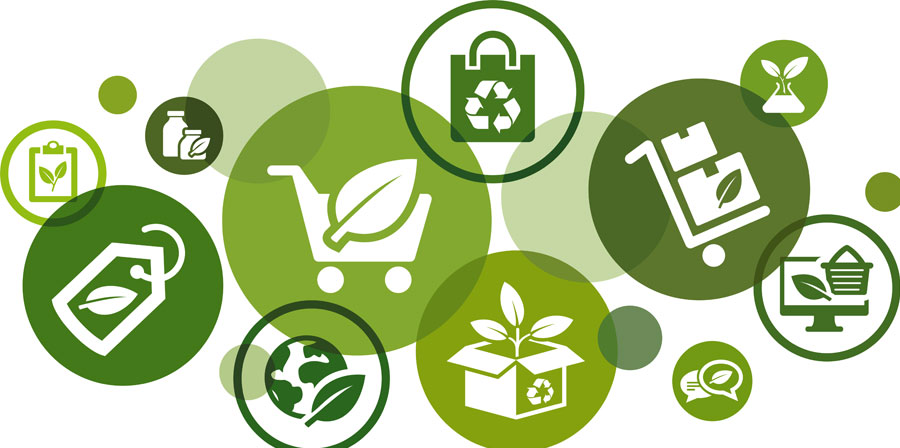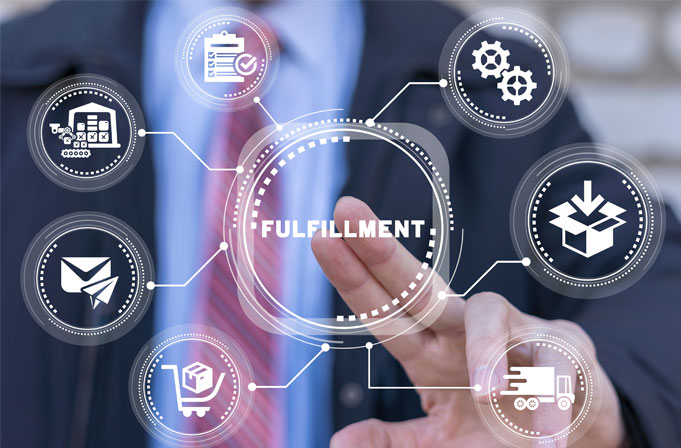Ecommerce fulfillment trends are shifting at lightning speed, and businesses must stay ahead to thrive. Every innovation brings a new opportunity to outpace competitors and delight customers. If you're not actively embracing the latest developments, you risk falling behind. Now's the time to dive in, discover the groundbreaking advancements, and position your business for unparalleled growth in the bustling ecommerce arena.
Each year, the fulfillment landscape is shaped by a convergence of innovation, consumer expectations, and technological breakthroughs. As 2024 approaches, it's evident that the path to quick and cost-effective fulfillment is set to take new turns, driven by a fusion of cutting-edge trends and an unwavering commitment to efficiency. In this article, we delve into the imminent ecommerce fulfillment trends that promise to redefine the essence of online shopping and create a path for aspiring ecommerce giants to follow in 2024 and beyond.
Incorporating these innovations isn't just about staying current—it's about leading the charge in an ever-evolving industry. Be the vanguard of change, and redefine the future of ecommerce fulfillment.
Adapting to these evolving methods isn't just strategic—it's essential. Embrace change and set the gold standard in modern ecommerce.

-
Technological Innovations in Warehousing and Fulfillment
In the fast-paced world of ecommerce, technological advancements don't just create efficiency—they revolutionize entire industries. If your business isn't keeping up, it's falling behind. Let's explore the groundbreaking innovations shaping the warehousing and fulfillment space that you’ll want to consider embracing in 2024.
- Automation and Robotics: Gone are the days of labor-intensive, error-prone manual processes. Modern fulfillment centers actively deploy robots and artificial intelligence (AI) to handle tasks ranging from picking items to managing inventory. A 2023 study by MHI and Deloitte revealed that 80% of survey respondents believe robotics and automation will be a source of competitive advantage in the next five years. Not only do these technologies optimize operations, but they also significantly cut down costs, positioning businesses for maximum profitability.
- Augmented Reality (AR) in Warehousing: Imagine a world where your warehouse staff can find products or detect potential hazards with the help of AR glasses. That's today's reality! AR actively enhances warehouse efficiency, safety, and inventory management. In internal testing, DHL found that warehouse pickers equipped with advanced smart glasses that displayed detailed pick lists and item locations were able to improve their picking efficiency by 25% and DHL was able to reduce onboarding and training time by 50%.
- 3D Printing for On-Demand Production: Customization has found its champion in 3D printing. Businesses are now producing specific, tailored items on-demand, eliminating the need for vast storage spaces. According to a study by PwC, more than 66% of manufacturers already utilize 3D printing in some way and nearly are expected to adopt some form of 3D printing by 2025, leading to reduced costs and more sustainable manufacturing practices.
- Data-Driven Insights: Numbers don't lie, and leading ecommerce giants know this all too well. Leveraging big data, businesses gain unparalleled insights into operations, inventory management, and customer preferences. A recent McKinsey report highlighted that data-driven companies are 23 times more likely to acquire new customers than their competitors. The study also found they are up to 6 times more likely to keep those customers long term and remain more profitable throughout the customer lifecycle.
- Automation and Robotics: Gone are the days of labor-intensive, error-prone manual processes. Modern fulfillment centers actively deploy robots and artificial intelligence (AI) to handle tasks ranging from picking items to managing inventory. A 2023 study by MHI and Deloitte revealed that 80% of survey respondents believe robotics and automation will be a source of competitive advantage in the next five years. Not only do these technologies optimize operations, but they also significantly cut down costs, positioning businesses for maximum profitability.
-
Delivery Speed and Convenience
Redefining Rapid: The Evolution of Ecommerce Delivery and Convenience
In today's digital age, speed isn't just a luxury—it's an expectation. As consumers increasingly crave instant gratification, businesses must rise to the challenge and redefine what it means to deliver. Dive into the innovative strides companies are making to bring products to doorsteps faster and more conveniently than ever before.
In the race against time, businesses are breaking barriers and setting new standards in delivery speed and convenience. Stay ahead of the curve and redefine what's possible in ecommerce fulfillment.
- Same-Day and Next-Day Delivery: As we usher in a new era of ecommerce, the clock is ticking. Customers are no longer content waiting for days to receive their orders. To meet this demand, businesses are investing heavily in logistics, technology, and partnerships. A McKinsey report on the future of final mile deliveries found that by 2025, same-day delivery will account for 20% of all parcel deliveries, emphasizing the need for businesses to ramp up their logistics game.
- Hyperlocal Fulfillment Centers: Think global but act local. By establishing micro-warehouses in strategic urban locales, businesses can now promise and deliver products within hours, not days. According to CBRE, urban warehouses are seeing a spike in demand, with lease rates climbing by 25% in prime areas. This strategy not only impresses customers with lightning-fast deliveries but also slashes traditional warehousing costs.
- Last-Mile Delivery Innovation: The journey's final stretch, from the nearest distribution center to the customer's home, is undergoing a significant transformation. Innovative solutions like crowd-shipping and smart hubs are making the process more efficient and secure.
- Subscription-Based Fulfillment: The allure of "set it and forget it" is undeniable. Customers are flocking to subscription models, ensuring they get their favorite products on a predictable schedule. Recent studies predict that the subscription ecommerce market will grow from $72 billion in 2021 to almost $900 billion by 2026, spotlighting the increasing consumer demand for consistent and reliable deliveries.
- Same-Day and Next-Day Delivery: As we usher in a new era of ecommerce, the clock is ticking. Customers are no longer content waiting for days to receive their orders. To meet this demand, businesses are investing heavily in logistics, technology, and partnerships. A McKinsey report on the future of final mile deliveries found that by 2025, same-day delivery will account for 20% of all parcel deliveries, emphasizing the need for businesses to ramp up their logistics game.
-
Sustainability and Ethics in Fulfillment
In an age where consumers are more conscious of their environmental and social footprint than ever, businesses are striving to meet this demand with sustainable and ethical practices. It's not just about making a sale; it's about making a difference.
Embracing sustainability and ethics isn't a trend—it's the future. Join the movement and shape a brighter, greener tomorrow.
- Sustainable Fulfillment: The days of excessive packaging and wasteful processes are numbered. Leading businesses are actively reducing waste by optimizing packaging sizes and embracing eco-friendly materials. Multiple studies have found that consumers are willing to pay more for sustainable products and younger generations seem to be driving this trend into something companies need to understand. Neilson Research found that 77% of millennials were actively searching for companies with environmentally friendly products and were willing to pay more to get them.
- Ethical Labor and Local Sourcing: Fair wages, safe working conditions, and local sourcing aren't just buzzwords—they're business imperatives. By reducing the carbon footprint associated with cross-country shipping and ensuring fair labor practices, companies are creating a win-win scenario. A study by Nielsen revealed that 73% of global consumers would definitely or probably change their consumption habits to reduce environmental impact.
- Sustainable Fulfillment: The days of excessive packaging and wasteful processes are numbered. Leading businesses are actively reducing waste by optimizing packaging sizes and embracing eco-friendly materials. Multiple studies have found that consumers are willing to pay more for sustainable products and younger generations seem to be driving this trend into something companies need to understand. Neilson Research found that 77% of millennials were actively searching for companies with environmentally friendly products and were willing to pay more to get them.
-
Personalized and Seamless Customer Experiences
In the digital age, a one-size-fits-all approach no longer cuts it. Today's consumers demand personalization, and businesses that deliver tailored experiences reap the rewards. Let's delve into how companies are crafting bespoke ecommerce journeys.
The evidence is overwhelming that delivering a personalized experience delights your customers and grows your business. Elevate your brand by tuning into individual needs and preferences.
- Personalization and Customization: In the bustling world of ecommerce, standing out is crucial. That's why businesses are investing in technologies that provide personalized packaging, product recommendations, and delivery options tailored to individual tastes. According to a study by Accenture, 91% of consumers are more likely to shop with brands that offer relevant offers and recommendations.
- Voice Commerce Integration: "Hey, Alexa, place my order!" Voice-enabled shopping is no longer the future—it's the present. With voice assistants becoming household staples, hands-free, seamless shopping experiences are gaining traction. A report by Juniper Research predicts that voice commerce sales will reach $80 billion annually by 2032.
- Enhanced Return and Exchange Processes: The end of the customer journey is as important as the beginning. Pioneering businesses are refining return and exchange processes, ensuring that they're as smooth and hassle-free as possible. A study by Narvar found that 95% of consumers would shop again with a retailer if the return process was easy.
- Influencer-Driven Fulfillment: Social media influencers are wielding their power in the ecommerce domain. By teaming up with these influential figures, businesses can offer exclusive products and bundles, driving demand and fostering a sense of community. Data Bridge Market Research recently released a report on influencer marketing showing the total market spend is expected to reach nearly $70 billion by 2029. The evidence seems clear that influencer marketing is effective and companies are increasingly looking to partner with people that have the attention of their target audience.
- Personalization and Customization: In the bustling world of ecommerce, standing out is crucial. That's why businesses are investing in technologies that provide personalized packaging, product recommendations, and delivery options tailored to individual tastes. According to a study by Accenture, 91% of consumers are more likely to shop with brands that offer relevant offers and recommendations.
-
Evolving Order and Delivery Methods
Navigating the ecommerce landscape means continually adapting and evolving. How customers order and receive their products is transforming, and businesses that stay agile will reap the rewards.
- Omni-Channel Fulfillment: The boundaries between online and offline shopping are merging. Forward-thinking companies are integrating multiple sales channels, ensuring seamless experiences for their customers. Harvard Business Review highlighted that omni-channel consumers spend 10% more online and 4% more in-store than single-channel consumers.
- Contactless and Secure Deliveries: Safety, especially post-pandemic, remains paramount. Innovative contactless delivery methods, from drones to autonomous vehicles, are becoming the norm, ensuring minimal physical interaction and maximum peace of mind. A study by Science Direct found the majority of global consumers prefer contactless delivery options due to health concerns and most do not expect that preference to change.
- Omni-Channel Fulfillment: The boundaries between online and offline shopping are merging. Forward-thinking companies are integrating multiple sales channels, ensuring seamless experiences for their customers. Harvard Business Review highlighted that omni-channel consumers spend 10% more online and 4% more in-store than single-channel consumers.
Charting the Future of Ecommerce Fulfillment: A Glimpse into Tomorrow
The ever-evolving landscape of ecommerce fulfillment has never been more vibrant or challenging. Technological innovations are reshaping warehousing, while consumer demands for speed and sustainability push businesses to redefine delivery methods. The merging of online and offline worlds, coupled with the heightened demand for personalized experiences, has set a new bar for what's expected in the industry. With data-driven insights at the helm, sustainability and ethics taking center stage, and customer experience being the ultimate differentiator, the future of ecommerce fulfillment beckons companies to be agile, innovative, and customer-centric.
As we gaze into this dynamic future, it's clear that staying stagnant is not an option. Ecommerce businesses must continuously adapt, innovate, and prioritize based on the needs and demands of their customers. From leveraging cutting-edge technologies to fostering ethical and sustainable practices, the journey ahead promises exciting opportunities and challenges. Those ready to embrace change and lead the charge will undoubtedly thrive, setting new benchmarks in the future of ecommerce fulfillment. As an industry leader in ecommerce fulfillment, Jillamy has worked with thousands of businesses to help them streamline their shipping and fulfillment processes. Contact us today at 800-592-7449 or schedule an appointment with one of our fulfillment specialists using the contact us page of our website.


